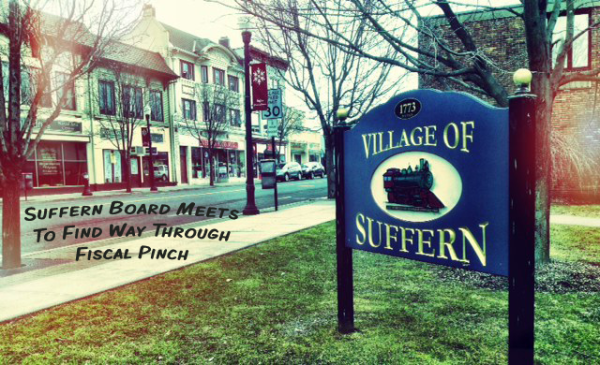The ghosts of budgets past are haunting the Village of Suffern.
The groans of stress from poor fiscal choices are now loud enough that they’ve spilled out of Village Hall and into the press and public alike.

The Village of Suffern Board meets Wednesday, February 4, at 7:30 p.m. in the Village Auditorium.
As first reported by Richard Gandon at Rockland Star on Tuesday and Akiko Matsuda in The Journal News on Wednesday, Suffern is so short of cash on hand that the village must borrow money to pay for recent DPW and police overtime. Suffern Department of Public Works personnel and police have been working at all hours the past few weeks to meet the demands posed by wicked winter weather.
Mayor Trish Abato called an emergency board meeting that took place Tuesday afternoon to discuss borrowing some $1.5 million to make payroll requirements. According to Mayor Abato, the proposed borrowed funds would keep the village going through May 31, 2015, the end of the village budget year.
Cash-strapped Suffern can’t pay workers’ overtime http://t.co/MVOCKUym3u via @lohud
— Akiko Matsuda (@LohudAkiko) February 4, 2015
Newly minted Trustees Ed Markunas and Bob Morris, along with Trustee Frank Hagen, voted to table the matter until Wednesday evening’s 7:30 p.m. board meeting. The delay may cause a shortage in overtime payment come this Friday’s payday.
Wednesday’s board meeting may be the where Suffern might have to pay the proverbial piper in that both Trustees Markunas and Morris campaigned on Suffern’s on-going fiscal distress, with Markunas being quoted in LoHud as saying Suffern’s current fiscal problems stem from “mismanagement, overestimating revenue, failed budgeting techniques and failed oversight.”
If Suffern’s misses overtime payments due employees, by law it could face an assortment of serious consequences if employees fight the action in court, including fines, double damage payments, and attorneys’ fees.
“What happened now is that they floated so many short-term bonds that we have a cash shortage, trying to pay these bonds,” Morris said in LoHud. “So as soon as revenue comes in, it’s merely going out to pay our debts.”


